
Interview date: 05/28/2009
Run date: 06/04/2009
Movies Home / Entertainment Channel / Bullz-Eye Home
There’s something extremely surreal about doing an interview with someone you’ve known for almost a decade – albeit predominantly virtually – but who has only just now begun to receive acclaim for his career. Very cool, but definitely still surreal.
I became acquainted with Dileep Rao when he, like my fellow Bullz-Eye editor David Medsker (a.k.a. the man I still can’t thank enough for bringing me onto this site in the first place), was a member of the E-mail list dedicated to the Scottish popsters known as the Trashcan Sinatras. Dileep and I have met a couple of times in person, and it probably goes without saying that we’re Facebook friends as well, but we’re not so close that I wasn’t shocked when Dileep dropped me a line through Facebook and said, “Hey, wanna interview someone from the cast of ‘Drag Me To Hell’? Because I know someone…” And when I checked his IMDb page and found that he’d also found himself amongst the cast of James Cameron’s “Avatar,” I was, like, “Dude, how awesome are you?”
A few weeks later, the man was strolling the red carpet at Cannes with Sam Raimi…and I was left laughing at the thought that, once upon a time, I’d believed that Dileep couldn’t possibly top the coolness of having been a winning contestant on “Jeopardy!”
Bullz-Eye: So, how’s it going, Mr. Big Shot?
Dileep Rao: (Laughs) I don’t know if I’m a big shot, but it’s going all right, man. This is pretty incredible!
BE: I dare say it is.
DR: Yeah, and there’s some crazy shit in the works, too. Man…
BE: It’s funny: before I even told my wife that you were in “Drag Me to Hell,” I actually told my friend Michelle Washington, who had drinks with us when you came into Norfolk. And she said, “That’s nuts.”
DR: (Laughs) That is nuts, though! That’s hilarious…but she’s exactly right. It’s been a really crazy year and a half, I have to say.
BE: So how did this whole ball get rolling for you? Was “Drag Me to Hell” first, and then “Avatar”?
DR: No, it’s the other way around! I shot “Avatar” almost completely in New Zealand when I had an audition for “Drag Me.” And I was going to do it on tape, and I shot it on tape with Giovanni Ribisi, one of my co-stars, reading with me. And then we didn’t finish the shots we needed to finish with Jim (Cameron), and then they said, “Why don’t you just go home, and we’ll call you back in a week or two, and we’ll shoot that?” And we’d been down in New Zealand absolutely forever, so I flew home…and I beat the tape back! So I go on and audition live with John Papsidera, the actual casting director, and lo and behold, Sam decided I was the guy, and we had a little meeting, and we decided what we wanted to do. And that’s exactly what we ended up doing.
BE: So I presume that you can tell me all of the spoilers about “Avatar,” because I understand Cameron is really good about letting his actors do that.
DR: Oh, yeah. That man would send solid gold robots to kill me. (Laughs) That’s a Conan O’Brien reference, if you haven’t heard that before. Uh, yeah, I don’t think I can divulge much more than that, yes, that’s the name of the movie, he directed it, and I’m in it. That’s about all I can say.
BE: Okay, I’ll ask a more generic one, then: how was it working with James Cameron?
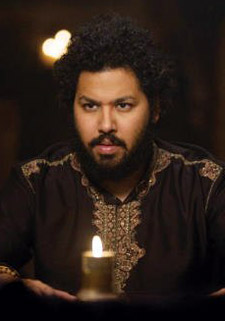 DR: Oh, fantastic. He’s a real visionary, a brilliant guy. The kind of imaginative power that he and Sam Raimi has, it’s not of the normal sort of “hey, I think I’ll make a movie” variety. These guys know exactly how to shoot the scenes they want, they know what it’s going to look like way ahead of time. They’re looking way into the future and already thinking about the discussions they’re going to have with the editor, which in Jim’s case is mostly himself and in Sam’s case is Bob Morosky. These guys are tremendous leaders who synthesize these departments and lead really well. It’s the leadership on set that I think is really the hallmark of a great director, because the vision is so clear to them… (Laughs) …and I’ve had the great fortune of working with two of them, so that’s pretty lucky!
DR: Oh, fantastic. He’s a real visionary, a brilliant guy. The kind of imaginative power that he and Sam Raimi has, it’s not of the normal sort of “hey, I think I’ll make a movie” variety. These guys know exactly how to shoot the scenes they want, they know what it’s going to look like way ahead of time. They’re looking way into the future and already thinking about the discussions they’re going to have with the editor, which in Jim’s case is mostly himself and in Sam’s case is Bob Morosky. These guys are tremendous leaders who synthesize these departments and lead really well. It’s the leadership on set that I think is really the hallmark of a great director, because the vision is so clear to them… (Laughs) …and I’ve had the great fortune of working with two of them, so that’s pretty lucky!
BE: To say the least!
DR: Yeah, Cameron is a really smart, smart man, but he also has a real understanding of the parts of filmmaking that aren’t particularly intellectually driven. There’s a lot of it that’s also driven by trust and faith that something’s going to happen, that something’s going to be truthful and interesting, and I think he has a lot of faith in what actors do. And the technical aspects of it are completely and totally under his command.
BE: Can you speak to who your predominant scenes are with?
DR: I can’t say.
BE: Fair enough. (Laughs) I’m picking my way around, because I certainly don’t want you to give away anything.
DR: Hey, you can ask me anything, Will. I’m not going to be offended in any way. I’m just going to tell you that most of it is gonna be “no comment,” because there’s an embargo like it’s the nuclear draft for what we do at Def-Con 4.
BE: It’s funny, because it’s now been over a year since I talked to Zachary Levi, and even then, he was all excited about how his buddy, Joel David Moore, was just finishing up his work in New Zealand on “Avatar.”
DR: Oh, yeah, Joel’s fantastic. He’s a very gifted actor, very funny, and not only does he have pitch-perfect comic timing, but he’s also got a real palpable sense of drama and truthfulness about him. He was a real joy to work with and have on set. I really bonded with him real early on, and I think our work – in the group, with all of us – was pretty strong, and he was a really big part of that.
BE: And I guess you must’ve gotten along with Giovanni relatively well, if you did the audition with him.
DR: Oh, yeah, he’s a great guy. He’s a sweetheart of a person and a talented fellow. He’s got a real understanding of his job, and his professionalism is really something to admire. But he’s just so talented and gifted. There were so many great people on the film.
BE: I’ve seen some of the concept art from “Avatar,” and, really, it’s mindblowing.
DR: Yeah, there’s some stuff I’ve seen…like, I don’t know what is and isn’t real, because some of it makes me wonder where they got it, and others are stuff I wouldn’t have seen while doing the movie, anyway. This is a movie that’s so large in scope. There are so many departments you never even really interact with you directly, but they interact with you indirectly, so…I have no way to know what’s what.
BE: Have you seen any of the footage in 3D yet?
DR: Um… (Slight laugh) …I can’t comment on that.
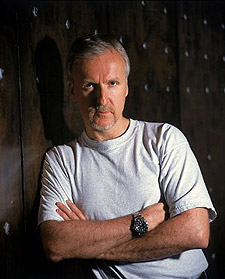 BE: (Laughs) Can’t comment on that, either. Fair enough, then: when they broached the fact that it was going to be in 3D, what was your reaction? Did you have a general opinion of 3D?
BE: (Laughs) Can’t comment on that, either. Fair enough, then: when they broached the fact that it was going to be in 3D, what was your reaction? Did you have a general opinion of 3D?
DR: I just have such enormous faith in Jim Cameron, just as a youth, from having seen the movies he made as a young man, and now, as a true artist, how strong his sense of personal relationships and filmmaking technology is. I just thought that if this guy wants to shoot this movie this way, it must be the best way to make the movie. It’s just a kind of…y’know, I don’t think people question an artist when they choose their medium, and he’s just a guy who really understands on a profound level how films are made and put together, and he decided to do something revolutionary because that’s generally how he works.
BE: I know Soderbergh has referred to what he’s seen of the film as “the craziest shit ever.”
DR: (Laughs) I don’t doubt that. I don’t doubt that he said that.
BE: So how did you make the jump from “Avatar” to “Drag Me To Hell”?
DR: Well, after I auditioned and Sam cast me, the timing was sort of such that we were going to start shooting pretty quickly, but we had some time, so I talked to Jim and Jon Landau, the producer of “Avatar,” and they said, “Go ahead and shoot your movie, and if we need you, we need you. Good luck.” So I went and changed my look a little bit, grew a bigger beard… (Laughs) …or, rather, grew a beard for “Drag Me.” And I just really started doing research for the role and working hard with Sam. A lot of the other artisans on the movie, we were putting ourselves in the place of the story, so the story became really real for us, and we worked really hard on it. That took over pretty quickly, and I was off and running for several months on the picture.
BE: How was Sam to work with as a director?
DR: Just a sweetheart, a bright light. He knows what it’s gonna be, what it’s gonna look like, how to shoot it…y’know, the other thing about this movie is that, for him, it’s a return for him to a genre and a way of filmmaking that’s the hallmark of his maturation as a young artist.
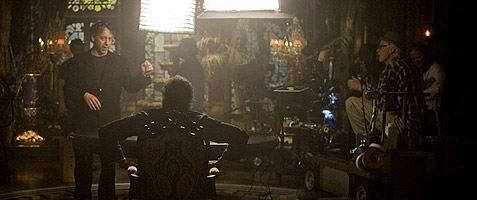
BE: Yeah, because he’s certainly done a lot of production of horror stuff in recent years, but it’s been ages since he’s directed one.
DR: Right, like you said, as a producer, he’s overseen many of these films, but he cut his teeth making these movies, so it’s really kind of amazing to watch a man who’s worked on such large-scale films as “Spider-Man,” “Spider-Man 2,” and “Spider-Man 3,” and all of the other great movies he’s made. I think “A Simple Plan” might be my favorite of his, although “Spider-Man 2” is also a masterpiece. But I think that watching him return to this work…he’s meticulous like Jim is, he’s a real collaborator, and he really works hard with the cast to get everything proper, everything makes sense, everything’s motivated correctly, and detail-oriented. The reason these guys are great filmmakers is that they have great talent, but it’s not an accident: they also work really hard, they’re incredibly focused, and they know what needs to have real attention paid to it when it goes in. As Jim once said to me, and Sam said very similar things to me, “Some things aren't baked in, and you can change those, no matter how much plasticity you’ve imposed.” And the process for Sam is, I think, very enjoyable, working with the actors and the writer. He himself was the writer, he and his brother, on this one. And that collaborative process really means a lot to him, I think. He’s a very generous, warm man.
BE: So tell me a little bit about your character, Rham Jas.
DR: Well, we started at the very beginning, asking, “How does this character really exist in the modern world? Let’s not just talk about the story.” So I said, “I think he’s probably from India, then he probably went to London and studied for a long time there. He got a doctorate from studying weird occult beliefs, the beliefs of people that we don’t always take seriously. And he would be a professor, sort of an Indiana Jones type for this weird stuff. Like, when people go, “I saw a ghost,” and people laugh at him, he actually goes and documents what the people say. And he doesn’t necessarily believe one way or the other, but he believes in some things that people don’t believe in, and because of his research and study of this stuff, he seems to have some sort of connection to, like, spiritualism, palm reading, and energistic study. He has some core belief that the world is larger than the world we know, and that character started for me there, and it made it much more believable that we were dealing with something that was, while fantastic, supernatural, and really goofy in some ways, it had to be less goofy and less impalpable in our process. So by the research I did and the reading I did, and the work I did with Alison and Sam, particularly, we really came up with a full back story for him and for why he would know what he knows.
BE: I read a review…the “Variety” review, actually…which referred to him as “an in-over-his-head street corner psychic.”
=DR: (Laughs) Yeah, I kind of like that, in a way, because I think we always wanted this dime-story feel to him, like he’s saying, “Yeah, I do this, but…” The cool thing about him is that he quickly realizes, “Uh, yeah, okay, I can’t deal with this.” And he calls in Adriana Barraza’s character, Shaun San Dena, and they go together on trying to defeat the spirit. I think the collaborative part of that is kind of cool, too, because it’s saying, “Hey, I know enough to know I’m not able to do this, so let’s call someone in who can.” And that is a very interesting aspect of the character that I built with Sam to be quite humble, and to not take pridefulness in his work, because he is a spiritualist. He has a kind of immaterialism and a lack of pridefulness to be a humble person. I think it fits well.
BE: So are you a horror guy yourself?
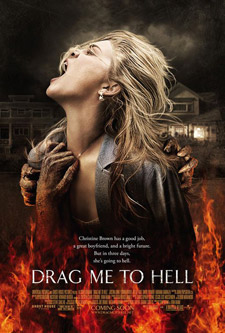 DR: Y’know, I think for me…okay, let me answer it this way: I’m a huge film person, so the horror movies that appeal to me are the ones that have transcended cultishness and aren’t the self-referential stuff. Like, I’ve seen many, many horror movies, because as a student of film and an appreciator of filmmaking, some of the most original and do-it-yourself start-up filmmaking is done in the genre. And I think it’s really, really cool. But the ones that have appealed to me the most are the most filmically transcendent. “The Shining” is the most psychologically scary film I’ve ever seen. It still freaks me out. There’s something about Kubrick’s understanding of the visual cortex perception of images, and the way he strings it together in a narrative structure…the power of that in a horror genre is truly for the ages. I still get freaked out when I think of that movie. But I like all of the classics. I like “Creepshow,” and I like “Dawn of the Dead,” and…I like the original “Halloween,” partially because I saw it at an age where you’re just terrified. You can’t see the effects, you can’t see the mask, you can just fear the absolute dread. And I loved the first “Friday the 13th.” I liked the first couple, actually, but then after awhile they just became…like, “Nightmare on Elm Street” became a place where I stopped watching those kinds of movies. But I also really liked “Scream.” I thought it was fun, even though it was a little tepid and light for a horror picture. But it’s still fun, and it had some really great acting, directing, and writing. Those movies are great. But…and this is my own personal taste, and I’m not criticizing anyone else’s…I never liked the torture-porn kind of horror films. You take a beautiful girl, and you beat her to death with a hammer for an hour and a half. I guess that’s a certain kind of thing…like, you have a family, there’s a guy with a gun, you don’t know why he wants to hold you hostage, but he does for an hour and a half? That just has limited appeal for me, just because the narrative structure isn’t strong enough for me.
DR: Y’know, I think for me…okay, let me answer it this way: I’m a huge film person, so the horror movies that appeal to me are the ones that have transcended cultishness and aren’t the self-referential stuff. Like, I’ve seen many, many horror movies, because as a student of film and an appreciator of filmmaking, some of the most original and do-it-yourself start-up filmmaking is done in the genre. And I think it’s really, really cool. But the ones that have appealed to me the most are the most filmically transcendent. “The Shining” is the most psychologically scary film I’ve ever seen. It still freaks me out. There’s something about Kubrick’s understanding of the visual cortex perception of images, and the way he strings it together in a narrative structure…the power of that in a horror genre is truly for the ages. I still get freaked out when I think of that movie. But I like all of the classics. I like “Creepshow,” and I like “Dawn of the Dead,” and…I like the original “Halloween,” partially because I saw it at an age where you’re just terrified. You can’t see the effects, you can’t see the mask, you can just fear the absolute dread. And I loved the first “Friday the 13th.” I liked the first couple, actually, but then after awhile they just became…like, “Nightmare on Elm Street” became a place where I stopped watching those kinds of movies. But I also really liked “Scream.” I thought it was fun, even though it was a little tepid and light for a horror picture. But it’s still fun, and it had some really great acting, directing, and writing. Those movies are great. But…and this is my own personal taste, and I’m not criticizing anyone else’s…I never liked the torture-porn kind of horror films. You take a beautiful girl, and you beat her to death with a hammer for an hour and a half. I guess that’s a certain kind of thing…like, you have a family, there’s a guy with a gun, you don’t know why he wants to hold you hostage, but he does for an hour and a half? That just has limited appeal for me, just because the narrative structure isn’t strong enough for me.
BE: Ironically, the “After Dark Horrorfest” films, which Sam helps produce, several of the entries have followed that line of horror. My wife loves horror films, but when we hit films like that, she’s, like, “Uh, no. That’s okay. Let’s move on to the next one.”
DR: Yeah, yeah, she’s right. I share your wife’s taste. For me, there’s something prurient about that, and it’s also…just as a medium of storytelling, it isn’t that strong visually. It becomes very personal and it isn’t as fun to watch.
BE: You can respect the horrific aspects, but if you can’t actually sit through it…
DR: And you shouldn’t come out of a horror movie feeling bad about yourself. You should come out feeling physiologically exhilarating by the hijinks and thrilled by it. If the story is strong and it kind of catches you, you go for the ride and you come out feeling that sense of, “They really goosed me, and I feel the adrenaline, and I’m excited to go talk about this movie over a burger,” then it’s done its job. Then you have a movie that’s worked on a fundamental level. And I think that’s what horror movies owe their audiences as much as any other movie does.
BE: So how far in advance did you find out you were going to Cannes?
DR: You mean “Drag Me To Hell,” or me myself?
BE: You yourself.
DR: I found out probably the week or two before, and that was because it was sort of up in the air as far as the timing and who was going and what we’d actually be doing over there. Because it doesn’t help the film if we’re not given the time to help it. I’m just glad that Lorna Raver and I were able to go and really help out. That was a thrill of a lifetime. I can’t express that more succinctly than that. Every minute was a thrill, and to be in a place that is a temple of film the way Cannes is…I mean, the audiences at Cannes are so knowledgeable, and the press is so diverse. It’s such a huge, international field. The interests of people are profoundly stated, they’re very clearly there, and they’re very forthright in what they believe about filmmaking. Everyone’s attitude is pretty clear, and you get into some incredible discussions in the hotel bar, or even with the driver! (Laughs) It’s been eye-opening. There’s no red carpet like that red carpet, there’s no feeling like that ovation when the lights come up and they all stand. That just doesn’t happen very often in life. It was pretty much a “pinch me” moment.

BE: And, plus, if you type in the words “Dileep Rao Cannes” into a search engine, you get something like 17,000 hits now.
DR: (Laughs) Yeah, whereas before, it probably just said, “Not!”
BE: Of course, this has also very positively affected your IMDb rating. (Writer’s note: As of the moment this sentence is being typed, Mr. Rao’s STARmeter sits at #3655.)DR: Uh, yeah, I think it probably did. (Laughs) I think my beard is getting a better IMDb rating than I am.
BE: It’s actually a full thousand points higher than you are.
DR: See, I knew it. Dammit! I think it signed on to do “Clash of the Titans” and didn’t even tell me!
BE: You know, it’s funny, but I talked to an actor named Antonio Elias a few days ago, and he’s in the new “Star Trek” movie, he’s only in it during the opening sequence, and yet his IMDb rating was, at least as of when we talked, somewhere in the 1800s.
DR: That is…I mean, if we’re talking about how bullshit the old Q ratings were, like, “Alan Alda is #19 for 1978,” I love that kind of shit, that some guy actually sat around and did that. But this is even more volubly ridiculous, because there’s an Indian actor named Shelley Malil who…I think he stabbed his girlfriend or some horrific thing? And he was the #1 star on the Movie Meter! And I’m thinking, “That can’t be what this thing is for!” I mean, yeah, people searched for him to see what he’d been in and where they’d seen him because he’d killed or stabbed his girlfriend. This is not some actual audience support. There has to be some way to accurately judge that. We’re all thankful for the great database that IMDb is, and I’m sure that, for less or more, the IMDb STARMeter does track people’s interest in actors, but just like any statistical study, there can be great volubility just because of a little bit of change.
BE: So how did you make this tremendous jump to “Avatar” all of a sudden? Because it seemed like you went from doing a couple of bit parts on TV shows to – BAM! – James Cameron and Sam Raimi!
DR: Well, yeah, and I think that’s what’s so interesting about this, because most people think of actors as wanting TV and film roles, and they just decide to do it, and suddenly they’re doing it. But acting, for me, has been a lifelong adult pursuit. I’ve done it since I was 18 years old, I’ve done it seriously since I was, like, 24.
BE: I was going to say, I know you’ve been pursuing acting as long as I’ve known you.
DR: Yeah, yeah, I’ve been acting professionally for a long time, but I’ve done mostly stage because my interest is in the stage, and the theater has always been very, very important to me. It’s the most immediate medium for the actor, you know, and you proceed and do it in front of a live audience, which is a great high wire act and a great safety-less way to do what one loves. I’ve always been a dedicated fan of the literary nature of the theater and of how strong the writing is in the theater, generally. For me, at least for my tastes, I longed to do movies and always wanted to do films, but to be perfectly frank, it’s not like it’s easy to get jobs in the movies. It’s not easy to get jobs in the theater. It’s not easy to get jobs anywhere! But the theater seemed to offer me more opportunities to do some cool stuff, to do some Shakespeare and some Tom Stoppard. Some really great playwrights, stuff that I had a real pride in. So that was a much more natural transition. The jump to “Avatar” is…well, I think Jim was looking for a very specific type of actor and I happened to be that type. It wasn’t even ethnically specific to an Indian guy. It was actually written ethnically open, I think. I got this role based on my reading. He just thought I was the guy…and it went from zero to one hundred miles per hour in a tenth of a second. I’m just glad that my training is strong enough, and that the people who taught me how to act taught me well enough that I can keep my freak-out energy low enough to do my job. But, yeah, it’s a really amazing bit of good fortune. I have incredible gratitude and humility towards it, because it could have been anyone else in either one of those cases, but I’m very fortunate that it’s me and that I’ve worked with Jim and Sam. I’m blessed.
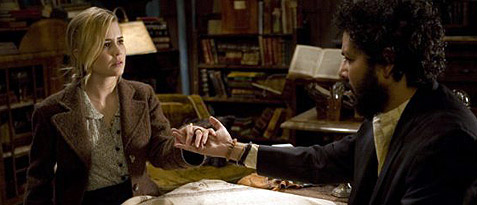
BE: And with that said, how long do you think it’ll be before the footage of you as a contestant on “Jeopardy!” will come back to haunt you?
DR: (Bursts out laughing) Well, if it comes back to haunt me, I guess it’ll be okay if they use the episode where I won. But if they find the one where I lost…? I’m not very proud of that. But I assume that, should I set foot on some talk show host’s stage in the future, they will have contacted whatever clearance house that records everything in history, and they will deliver unto them the tape of me in my fine blue suit, sparring with Alex Trebek.
BE: And I’ll blame myself, because I’m the one putting it out there on the internet.
DR: Yeah! Damn you, Will! (Laughs) Dammit!
BE: “Dileep Rao was on ‘Jeopardy’? I gots to see that!”
DR: You know where that’s going to show up? In the trivia section of my IMDb listing. (Laughs)
BE: I wonder if I can add that right now…
DR: You could! June 2002, buddy: that’s when I was on. And, hey, it was great! I’ll tell you something: as an actor, and as most actors know, the surviving until you start to really make enough money to put money aside and think about long-term solvency, that’s the hardest part of choosing that career. And “Jeopardy!” was a cash infusion that allowed me to write for a long time – it was like a writing fellowship, so I could write screenplays and teach myself to write – and work out all of my little career things. I was doing a play on stage when I did it, and it really helped me. I didn’t drain it completely, but I invested it, and I survived off of it, and I worked a little less on my day job. I firmly believe it accelerated my development as an actor and a writer.
BE: Thank you very much, Alex.
DR: (Laughs) Yeah, absolutely!
You can follow us on Twitter and Facebook for content updates. Also, sign up for our email list for weekly updates and check us out on Google+ as well.











